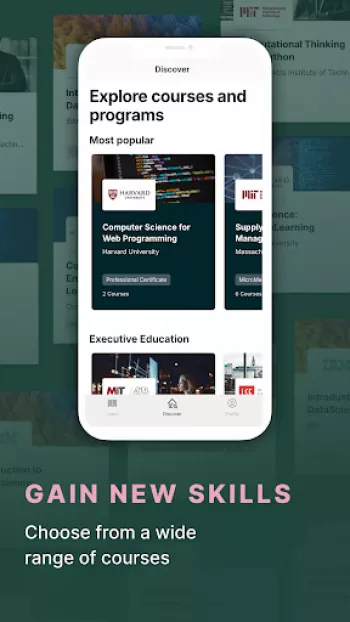Apps Home

The Evolution and Impact of Online Learning
Online learning has evolved from its humble beginnings as correspondence courses to a dynamic and integral component of modern education. The dramatic increase in internet speed, coupled with the proliferation of smartphones and technological advancements, has revolutionized how education is distributed and consumed globally. E-learning platforms such as edX have harnessed these technological advancements to partner with prestigious institutions like MIT, Harvard, Amazon, and Google, democratizing knowledge by making high-quality education accessible to a global audience. This evolution is not merely technological but also cultural, as educational accessibility is increasingly recognized not as a privilege but a right. Online learning platforms allow individuals from various socio-economic backgrounds and geographies, who may not have been able to afford or physically attend prestigious universities, to partake in high-level education from the comforts of their homes. This shift has not only broadened educational access but has also diversified the learning community, enriching the experience for all participants. Furthermore, the flexible nature of online learning allows for balancing education with personal and professional responsibilities, which is a significant advantage for adult learners and professionals. E-learning has also fostered a shift in pedagogical methods, incorporating multimedia and interactive content to enhance engagement and retention. The ability to integrate AI, VR, and AR into learning modules provides an immersive learning experience that is often more personalized than traditional methods could offer. As we progress, it becomes evident that online learning is not just a temporary trend but a fundamental shift in the educational paradigm, offering tailored and flexible learning paths, promoting lifelong learning, and empowering learners to control their educational journey.
The Advantages of Learning from Top Universities Online
Enrolling in online courses from top-tier universities provides numerous advantages beyond accessibility and flexibility. One of the primary benefits is exposure to world-class educators and content, which is pivotal in enhancing the learning experience. For instance, platforms like edX associated with MIT and Harvard bring the expertise of distinguished professors directly to the learner, ensuring the content is not only current but also deeply insightful into the latest academic and practical trends. The coursework is often interdisciplinary, blending theory with real-world applications, which is evident in subjects like AI or data science where learners engage in problem-solving exercises that simulate real business challenges. Additionally, learning from reputed institutions adds substantial weight to one's resume, signaling to potential employers a strong commitment to quality education and self-improvement. Certificates and degrees earned online are increasingly regarded similarly to those obtained on-campus, which reflects the recognition of online education's credibility and rigor. Beyond the credentials, the knowledge gained can instigate substantial career shifts, enable learners to specialize in new areas, or even pivot to entirely new industries. For example, professionals in supply chain management might take courses in sustainability offered by these institutions to enhance strategic decision-making and adapt to the global emphasis on green operations. These learning opportunities serve to bridge the knowledge gap between academia and industry, preparing learners not just to participate but to lead in their respective fields. As such, online courses from top universities are more than an educational opportunity—they are gateways to personal development and professional advancement.
Navigating the Challenges and Overcoming Online Learning Barriers
While online learning offers numerous benefits, it is not without its challenges. One of the primary hurdles students face is maintaining motivation and self-discipline throughout their courses. The absence of physical classrooms and face-to-face interaction can sometimes lead to a sense of isolation or procrastination, making it essential for learners to develop robust time management skills and self-regulation strategies. Leveraging platform features, such as group discussions, video conferencing, and forums, can help mitigate feelings of isolation and offer critical interaction opportunities with peers and instructors. It is also crucial for students to set clear learning goals and milestones to stay focused and motivated. Another significant challenge is the technological barrier—ensuring that all learners have the necessary hardware and stable internet connection to fully participate in online courses. While platforms strive to minimize these barriers by optimizing content for low bandwidth and providing downloadable resources, disparities still exist, particularly in underserved regions. Moreover, technical difficulties or lack of familiarity with digital learning tools may hinder some students' ability to engage effectively with course materials. Addressing these challenges requires concerted efforts from both online platforms and learners. Institutions may consider offering digital literacy workshops to enhance students' technological competence. Meanwhile, learners can actively seek help through customer support or engage with community forums to troubleshoot issues. Ultimately, the success of online learning depends on the collaboration between educational institutions, technology providers, and students to create a supportive and inclusive learning environment that accounts for various learning styles and access needs.
Technological Innovations Enhancing the Online Learning Experience
Technological innovations continue to shape the landscape of online learning, enhancing the educational experience and making it more interactive and effective. AI and machine learning are at the forefront of this transformation, offering personalized learning experiences by analyzing students' interactions with course materials and suggesting customized resources to address individual learning gaps. Similarly, adaptive learning technologies adjust the content's difficulty based on the learner's performance, offering a tailored educational journey that maximizes potential while maintaining engagement. Virtual and augmented reality technologies further enrich online education, enabling experiential learning that could previously only occur in a physical setting, such as virtual labs for scientific experiments or historical site tours for archaeology students. Gamification elements, including badges and leaderboards, motivate learners by introducing a competitive element that enhances participation and retention. Moreover, blockchain technology is emerging as a revolutionary tool for credentialing, providing a secure, verifiable, and tamper-proof method for storing academic records, ensuring that employers can trust digital credentials. With these technologies, online learning platforms increasingly simulate the in-person experience, offering low-stakes quizzes and interactive sessions that closely mimic classroom dynamics. As technological innovation continues, online platforms will likely become even more sophisticated, offering unprecedented levels of interaction and engagement, ultimately enhancing both the educational experience and outcomes for learners worldwide.
Making the Most of Online Learning Opportunities with edX
To truly leverage the offerings of online education, it is essential for learners to approach platforms like edX strategically. The first step is to identify personal and career goals, which will guide the selection of courses or programs that align with these objectives. It is advantageous for learners to explore a range of options, from free courses to more comprehensive programs such as professional certificates or full degrees, based on their professional trajectory and financial constraints. edX provides diverse content across critical disciplines such as AI, supply chain management, and sustainability, enabling individuals to upskill or reskill as necessary. Learners should also take advantage of edX's mobile app to integrate learning into their daily routines. With features allowing content streaming, offline access to materials, and progress tracking through quizzes and assignments, the app supports continuous learning without the limitations imposed by geographic or temporal constraints. Finally, networking with fellow learners through platform forums can provide valuable insights and foster a supportive community of like-minded individuals, essential for maintaining motivation and engagement. Embarking on courses like those provided on edX is not merely about acquiring knowledge; it is about transforming your educational journey to fit the modern world and equipping oneself with the skills demanded by today's dynamic job market. To embark on this transformative journey, individuals can conveniently begin by downloading the edX app: Download for Android or Download for iPhone, empowering themselves to steer their education and future career path from the palm of their hand.
Share Your Opinion
Your Email Will Not Be Published.
All Rights Reserved © Apps Home 2025













































Phoenix Flowers
Just used the app to enroll and begin my first course provided by edx. And just WOW! After perusing the course info, watching the welcome video and...
A Google user
The app is fairly well-designed and the edX site as a whole is phenomenal for following up on any sudden interests you have completely free. There ...
Eric Heiss
Very intriguing and no cost to get into a course that you may be interested in "if available" with the option to pay into the course you find for a...
Neil Abrahams
the phone app works very well. edx has made its catalog approachable for different types of users. an excellent way to explore what's available in ...
A Google user
This is a really free, useful, educational app I have known. It provides lots of course and programs for anyone to learn. However, about the functi...